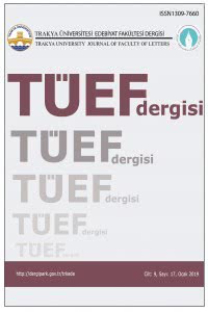KURGU MU, TARİH Mİ? TARİHİ KURGU VE KURGUSAL TARİH ÜZERİNE TEORETİK DEĞERLENDİRMELER
Tarihi kurgu, tarihi roman, tarih yazımı, edebi tür çalışmaları, edebiyat
___
- Aristotle, “Poetics” in Aristotle in 23 Volumes, Vol. 23, trans. W.H. Fyfe, Harvard University Press, Cambridge, MA; William Heinemann Ltd., London, 1932. Available online:http://www.perseus.tufts.edu/hopper/text?doc=Perseus%3Atext%3A1999. 01.0056%3Asection%3D1447a
- Brodine, Virginia Warner, “The Novelist as Historian,” The Historian Teacher. Vol. 21, No. 2, 1988, pp. 207-13.
- Brumm, Ursula, “Thoughts on History and the Novel,” Comparative Literature Studies, Vol. 6, No. 3, Special Issue on the Art of the Narrative, 1969, pp. 317-330.
- Butterfield, H., The Historical Novel. Cambridge, 1924.
- Carruthers, G. Irwin, “Historical Novels,” Greece and Rome. Vol. 5, No. 15, 1936, pp. 177-81.
- Collingwood, R. G., The Idea of History. Oxford, 1946.
- Da Silva, Teresa Christina Cerdeira and Suzetta Macedo, “The Aura of History in Historical Fiction,” Portuguese Studies, Vol. 14, 1998, pp. 205-214.
- Derrida, Jacque, Writing and Difference, Reprint 1993 Edition, trans. Alan Bass, U of Chicago P., 1978.
- Fleishman, Avrom, The English Historical Novel, Baltimore, 1971.
- Foucault, Michel, The Order of Things: An Archeology of the Human Sciences, Vintage, 1994.
- Frye, Northrop, Anatomy of Criticism: Four Essays with a New Foreword by Harold Bloom, Princeton UP., 2004.
- Hine, Robert V.,“When Historians Turn to Fiction.” The History Teacher, Vol. 21, No. 2, 1998, pp. 215-19.
- Holmes, Frederick M. (1997). The Historical Imagination: Postmodernism and the Treatment of the Past in Contemporary British Fiction. Canada: University of Victoria.
- King, Clive, “The Historical Novel: An Under-Used Resource,” Teaching History, No. 51, 1988, pp. 24-26.
- Lascelles, Mary, The Story-Teller Retrieves the Past, Oxford, 1980.
- Levi-Strauss, Claude, The Savage Mind. Chicago, 1966.
- Lukacs, Georg, The Historical Novel. Trans. Hannah and Stanley Mitchell, London, 1962.
- Manzoni, Alessandro, On the Historical Novel. Trans. Sandra Bermann, Lincoln, 1984.
- Margaronis, Maria, “The Anxiety of Authenticity: Writing Historical Fiction at the End of the Twentieth Century,” History Workshop Journal, No. 64, 2008, pp. 138-160.
- Munslow, Alun, Deconstructing History, London, 1997.
- Waters, Bruce, “The Past and the Historical Past,” The Journal of Philosophy. Vol. 52, No. 10, 1955, pp. 253-69.
- Voltaire, The Philosophy of History, Philosophical Library, 2007.
- White, Hayden, “Interpretation in History,” New Literary History, Vol. 4, No. 2, 1973, pp. 281-314.
- _____________, Metahistory: The Historical Imagination in Nineteenth Century Europe, Baltimore, 1973.
- _____________, Tropics of Discourse: Essays in Cultural Criticism. Baltimore, 1978.
- _____________, The Content of the Form: Narrative Discourse and Historical Representation, Baltimore, 1987.
- Williams, Michael, “Opportunities in Historical Fiction,” The Catholic Historical Review, Vol. 8, No. 3, 1922, pp. 360-371.
- ISSN: 1309-7660
- Yayın Aralığı: 2
- Başlangıç: 2011
- Yayıncı: -
Orthodox Churches in the Township of Didymoteicho and Soufli
BİLİMSEL PSİKOLOJİNİN TARİHSEL SÜRECİ ÜZERİNE
KURGU MU, TARİH Mİ? TARİHİ KURGU VE KURGUSAL TARİH ÜZERİNE TEORETİK DEĞERLENDİRMELER
BOSNA HERSEK: ANAYASAL, ANAYASAL GELİŞMELERİ VE POLİTİK SİSTEMİN ANALİZİ
PROFESYONELLEŞMEDEN MEŞRUİYET KRİZİNE SOSYOLOJİNİN KULLANIMI
HADRİANOPOLİS ROMA DÖNEMİ FIRIN MALZEMESİ
TIOS-TIEION: SÖYLENECEK ÇOK ÖNEMLİ BİR ŞEYİ OLMAYAN KENT
BEYZÂVÎ’NİN MESÂBÎHU’S-SÜNNE ŞERHİ TUHFETÜ’LEBRÂR’DAKİ HADİS ŞERH METODU
